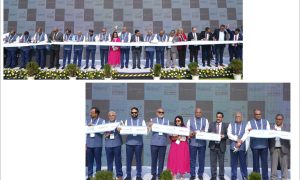In the Indian manufacturing scenario, particularly in the HVAC industry, a sustainable phenomenon is underway. This feature explores how advanced technologies are steering a greener future, focusing on energy efficiency, renewable sources, and IoT-driven initiatives, skilling manpower – thus catalysing a shift towards eco-friendly easiness.
“We are working to make India a ‘Viksit Bharat’ by 2047. To achieve that goal, we must improve people’s capability and empower them”: Nirmala Sitharaman.
The current HVAC industry produces cutting-edge energy-efficient equipment and systems, gaining popularity among consumers and businesses. HVAC devices that are energy-efficient aim to optimise performance while minimising energy consumption. Adopting eco-friendly heating and cooling systems in commercial and industrial buildings is increasingly mandated by updated building codes, policies, and regulations. Companies now have greater access to renewable energy and sustainable technologies, facilitating a transition towards greener alternatives and environmentally conscious HVAC practices. As the industry adapts to the demands of the digital world, challenges arise in modernising manufacturing facilities. Key among these challenges is the need to upgrade existing infrastructure and processes to align with the requirements of an evolving digital landscape. This transformation requires investing in new technologies, ensuring at the same time that the workforce is equipped with the necessary skills to thrive in this digital era.
Initiatives in energy efficiency, renewable sources, and IoT-driven water conservation are at the forefront, aligning with environmental easiness and embracing advanced technologies. Facilities operating on over 90 percent renewable energy, driven by solar and wind power, signify a substantial reduction in reliance on fossil fuels. Leveraging IoT technology optimises water usage and earns recognition like LEED Zero Water for eco-friendly practices. From printed circuit board assembly to testing, the entire manufacturing process is IT-driven, exemplifying a commitment to environmental responsibility and a sustainable future. However, sustainability is a relevant trend in our industry, particularly India’s commitment to reducing greenhouse gas emissions. The HVAC sector is actively shifting towards sustainability through decarbonisation, electrification, and adopting low-global Warming Potential (GWP) refrigerants, says Ayan Mitra, Director – Exports, FläktGroup.
AL, ML promote energy efficiency
Manufacturers can allocate human resources to more complex tasks by automating repetitive and labour-intensive tasks, driving overall productivity and innovation. AI, ML, robotics, and other emerging technologies are necessary for driving the evolution of various Indian sectors, including the HVAC industry, while also advancing sustainability. Integrating these advanced technologies into manufacturing facilities demands planning, efficient resource allocation, and coordination. This process encompasses retrofitting current machinery and systems, adopting new software and hardware solutions, and effectively training the workforce to utilise these cutting-edge technologies.
AI and ML, while promoting energy efficiency, play a role in analysing HVAC system data. Real-time adjustments based on temperature, humidity, occupancy patterns, and weather forecasts result in substantial energy savings and a reduced carbon footprint. Predictive maintenance, enabled by AI and ML, proactively identifies potential issues, minimising downtime and decreasing energy waste.
Smart HVAC controls utilising sensors, occupancy data, and AI algorithms optimise temperature, airflow, and ventilation rates. This ensures comfort while minimising energy consumption by avoiding unnecessary cooling or heating of unoccupied spaces. AI and ML also contribute to monitoring and improving indoor air quality (IAQ) by analysing data from air quality sensors.
Integrating robotics and automation can potentially revolutionise the HVAC industry, automating tasks such as system inspection, maintenance, and cleaning. Equipped with sensors and AI capabilities, robotic machines navigate complex environments, detect issues, and perform maintenance tasks more efficiently than humans, enhancing system performance in manufacturing setups.
AI and ML enable the HVAC sector to make data-driven decisions. They play a crucial role in the design and construction of HVAC systems. Engineers can use these technologies to model and improve energy performance, maximising energy efficiency and sustainability through algorithms and computer modelling even before the commencement of construction. Integrating advanced technologies empowers Indian companies to enhance sustainability, minimise energy consumption, improve interior comfort, and optimise the efficiency and performance of HVAC systems and shop floor environments.
The shift towards modernisation also necessitates a cultural and mindset change within organisations. It requires a shift towards embracing innovation, agility, and continuous improvement in systems and processes along with organisational culture and mindset.
Green technologies
Green growth is one of the seven priorities to guide India into Amrit Kaal, said Nirmala Sitharaman. Implementing green technologies, including variable speed compressors and energy recovery systems, presents cost-saving opportunities and reduces environmental impact. Incorporating innovative technologies and prioritising excellence in manufacturing technology further enhances efficiency, traceability, and quality control. For example, energy-efficient technologies can significantly reduce energy consumption and lower utility costs. Companies can also reduce waste generation and associated disposal costs by optimising resource usage, such as water and raw materials.
Ravichandran Purushothaman, India’s president at Danfoss, emphasises the importance of actively engaging with stakeholders to promote the adoption of green energy and reduce the collective carbon footprint. Danfoss has set a target to become carbon neutral in scope 1 and 2 emissions by 2030, aligning ESG principles.
Furthermore, initiatives focused on eco-friendly manufacturing are frequently accompanied by process optimisation and automation, leading to improved operational efficiency and productivity. The streamlining of workflows, elimination of redundancies, and reduction in downtime collectively contribute to significant cost savings and increased profitability. Creating a more sustainable manufacturing ecosystem is further facilitated by localising supply chains, optimising packaging and transportation, embracing digitalisation, adopting advanced manufacturing technologies, and maintaining a commitment to quality excellence.
Modernise HVAC manufacturing
The Indian HVAC industry operates within a complex regulatory framework with stringent compliance standards. According to Kishore Patil, Country Head at Trane HVAC Business – India and SAARC Markets, manufacturers aiming to upgrade their facilities encounter challenges adapting to evolving laws, certifications, and requirements related to safety, environmental impact, and energy efficiency. Navigating these regulatory obligations can be formidable for companies seeking to modernise their operations.
Modernising manufacturing facilities faces challenges, particularly for small and medium-sized enterprises. The capital investment required for advanced machinery, robotics, and digital technologies poses a barrier. Additionally, addressing the need for a skilled workforce, reliable infrastructure, and compliance with complex regulations is crucial for successful implementation.
Implementing modern technology in the HVAC industry requires a skilled workforce capable of operating, maintaining, and troubleshooting advanced machinery and systems. The HVAC sector faces challenges in India due to a need for more competent labour and specialised training. Establishing adequate training programs and initiatives to address this issue and ensure a trained workforce for the modernisation process is essential. The execution of modernisation initiatives in the HVAC industry often depends on infrastructure and connectivity, encompassing reliable power supplies, internet access, and data networks.
The adoption of new technology in manufacturing necessitates cultural and procedural shifts. Overcoming resistance, enhancing knowledge, and effective change management are crucial for a successful implementation. Furthermore, integrating modern technology throughout the HVAC supply chain poses challenges related to compatibility and communication among suppliers, manufacturers, and contractors. To surmount these challenges, collaborative efforts among stakeholders, government support, skill development programs, research and development initiatives, and awareness campaigns are essential for promoting modernisation in the HVAC industry.
Tushar Shinde, National HVAC Specialist at Belimo Automation India, highlights the role of customised touch screens, Extended Warehouse Management (EWM) programs, and energy valves in improving productivity on air-conditioned shop floors. According to him, customised touch screens speed up the automation process to enhance productivity in air-conditioned shop floors. An Extended Warehouse Management (EWM) program reduces component pickup time and errors. Battery-powered material handling equipment and digital screens on the shop floor help manage material movement.
In conclusion, AI and ML algorithms are driving the creation of intelligent HVAC systems, optimising energy usage and enhancing comfort levels. This focus on innovation and automation enables manufacturers to stay competitive, achieve operational efficiency, and deliver customer delight through improved products and streamlined processes. The transformation towards green practices in Indian HVAC manufacturing signifies a commitment to a sustainable and environmentally friendly future.
=================
Cookie Consent
We use cookies to personalize your experience. By continuing to visit this website you agree to our Terms & Conditions, Privacy Policy and Cookie Policy.















